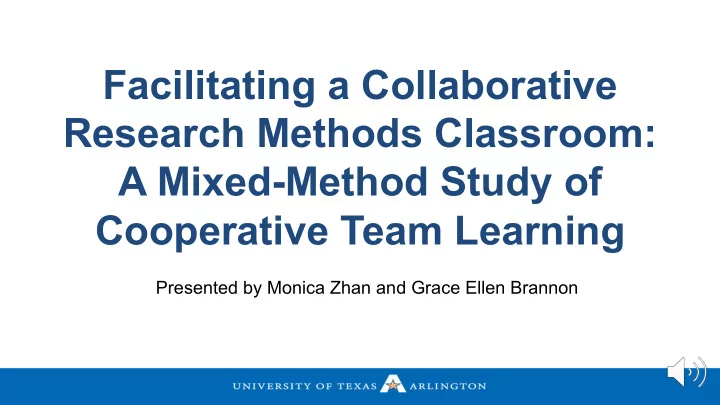

Facilitating a Collaborative Research Methods Classroom: A Mixed-Method Study of Cooperative Team Learning Presented by Monica Zhan and Grace Ellen Brannon
Introduction • Communication students are afraid of taking a research methods class and some of them struggle with understanding the materials. • Part of this may be due to communication apprehension, part of it may be because they are not confident in their knowledge levels. We will attempt to explore some of these issues, while simultaneously applying a team-based learning model as an intervention.
Study Background • We argue that cooperative learning teams provide several major benefits to students. • Student teams are a critical resource that students can turn to besides the instructor, because the team environment would be less stressful for asking questions and perceived to be more accessible. • Students who explain concepts to team members understand the concepts better during the process. • Besides informational support, students may feel more secure when they have emotional support from team members.
Methods and Interventions • Mixed-Method Study: Pre- and Post-Survey, In-depth Interviews • Interventions: • Emphasized the importance of the cooperative learning teams in class verbally • Two small group assignments • An exam question that asks who might know the answer to a specific question • Implemented a Canvas and Teams set up for groups to encourage peer-to-peer communication
Interviews • Sample included 5 in-depth Teams interviews to further explore their experiences participating in the cooperative learning teams •Sample interview questions included •“How do you feel being in the team enhanced your learning in this class?” •“What was the biggest teamwork challenge when classes shifted to online?” •Participants provided pseudonyms for future publication purposes •Interviews lasted between 17-27 minutes in length and were audio- recorded •While saturation could not be reached after 5 interviews, several themes are identifiable
Results: Surveys • Quantitative Results: • Pre-survey results: students registered for the research methods class tended to have • high-levels of self-efficacy in academics • high learning goal orientation • positive teamwork experiences and course perception. • The results of the post-surveys indicated that students felt that they received assistance and attention from peers, but peer acknowledgement seemed to be relatively low.
Results: Interviews • Qualitative Results • Four themes emerged: • Communication challenges pre- v. post- COVID-19 • “Now that we’re online, the communication has gotten a lot, A LOT worse.” – BEARZ • Likability v. knowledge of teammates • “I found everyone very friendly…[describes project] it was very neutral, I wouldn’t think too much into how I feel about them…but I think if I could describe them all other than friendly I’d say very busy…I have two members [that don’t contribute]…which is kind of sad.” – Opal Valentine • Face/GPA management • “It’s like, how do you like talk about that without making someone feel uncomfortable or something.” - Zapchbell • Isolation • “It definitely is a lot harder to learn or want to learn by yourself without the fun activities in class without all the cool stuff in class, that made it fun and interesting to want to learn.” – BEARZ • “It doesn’t feel good to be disconnected from everyone…life is [more] complicated.” – Opal Valentine • Another possible theme: • Sacrifice
Moving Forward • Based on our results, we plan to continue the project by: • Revise and improving the cooperative learning team intervention • Expanding the measurement tools to include behaviors as well as including attitudes and cognitions • Exploring the effectiveness of the intervention in other disciplines
Recommend
More recommend